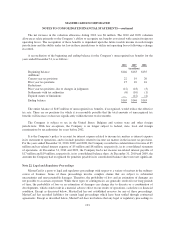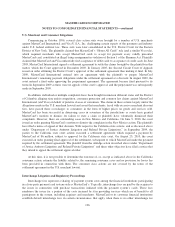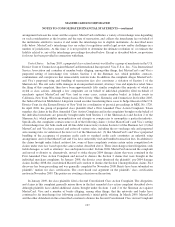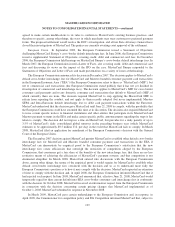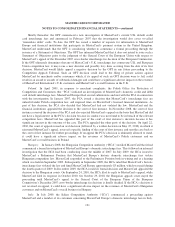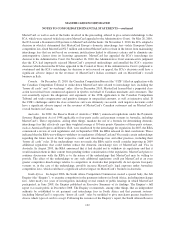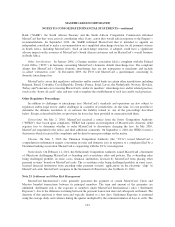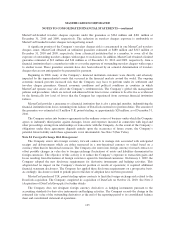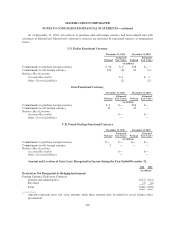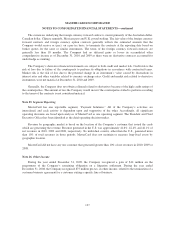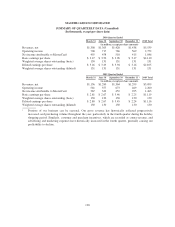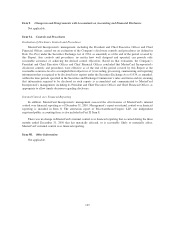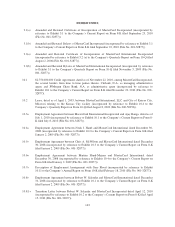MasterCard 2010 Annual Report Download - page 143
Download and view the complete annual report
Please find page 143 of the 2010 MasterCard annual report below. You can navigate through the pages in the report by either clicking on the pages listed below, or by using the keyword search tool below to find specific information within the annual report.MASTERCARD INCORPORATED
NOTES TO CONSOLIDATED FINANCIAL STATEMENTS—continued
Bank (“SARB”), the South African Treasury and the South African Competition Commission informed
MasterCard that they were actively considering what, if any, action they would take in response to the Enquiry’s
recommendations. In September 2010, the SARB informed MasterCard that it intended to appoint an
independent consultant to make a recommendation on a simplified interchange structure for all payment systems
in South Africa, including MasterCard’s. Such an interchange structure, if adopted, could have a significant
adverse impact on the revenues of MasterCard’s South African customers and on MasterCard’s overall business
in South Africa.
Other Jurisdictions. In January 2006, a German retailers association filed a complaint with the Federal
Cartel Office (“FCO”) in Germany concerning MasterCard’s domestic default interchange fees. The complaint
alleges that MasterCard’s German domestic interchange fees are not transparent to merchants and include
so-called “extraneous costs”. In December 2009, the FCO sent MasterCard a questionnaire concerning its
domestic interchange fees.
MasterCard is aware that regulatory authorities and/or central banks in certain other jurisdictions including
Belgium, Brazil, Colombia, Czech Republic, Estonia, France, Israel, Latvia, the Netherlands, Norway, Slovakia,
Turkey and Venezuela are reviewing MasterCard’s and/or its members’ interchange fees and/or related practices
(such as the “honor all cards” rule) and may seek to regulate the establishment of such fees and/or such practices.
Other Regulatory Proceedings
In addition to challenges to interchange fees, MasterCard’s standards and operations are also subject to
regulatory and/or legal review and/or challenges in a number of jurisdictions. At this time, it is not possible to
determine the ultimate resolution of, or estimate the liability related to, any of the proceedings described
below. Except as described below, no provision for losses has been provided in connection with them.
Switzerland. On July 2, 2010, MasterCard received a notice from the Swiss Competition Authority
(“WEKO”) that, based upon complaints, WEKO had opened an investigation of MasterCard’s domestic debit
acquirer fees to determine whether to order MasterCard to discontinue charging the fees. In July 2010,
MasterCard responded to the notice and filed additional comments. On September 1, 2010, the WEKO issued a
decision in which it rejected the complaints and declined to open proceedings on the matter.
Ukraine. On June 5, 2010, the Ukrainian Competition Authority (the “UCA”) issued MasterCard a
comprehensive information request concerning its rules and domestic fees in response to a complaint filed by a
Ukrainian banking association. MasterCard is cooperating with the UCA’s investigation.
Netherlands. On February 11, 2011, the Netherlands Competition Authority issued MasterCard a Statement
of Objections challenging MasterCard co-branding and co-residency rules and policies. The co-branding rules
being challenged prohibit, in some cases, financial institutions licensed by MasterCard from placing other
payment systems’ brands on MasterCard cards. The co-residency rules being challenged prohibit, in some cases,
licensed financial institutions from encoding other payment systems’ applications on the electronic “chip” in
MasterCard cards. MasterCard’s response to the Statement of Objection is due by March 11, 2011.
Note 23. Settlement and Other Risk Management
MasterCard International’s rules generally guarantee the payment of certain MasterCard, Cirrus and
Maestro branded transactions between its principal members. The term and amount of the guarantee are
unlimited. Settlement risk is the exposure to members under MasterCard International’s rules (“Settlement
Exposure”), due to the difference in timing between the payment transaction date and subsequent settlement. The
duration of this exposure is short term and typically limited to a few days. Settlement Exposure is estimated
using the average daily card volumes during the quarter multiplied by the estimated number of days to settle. The
133


